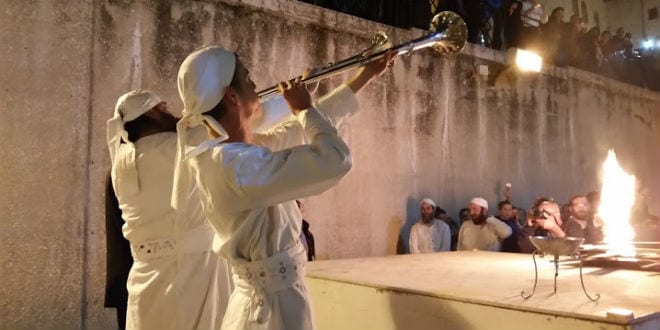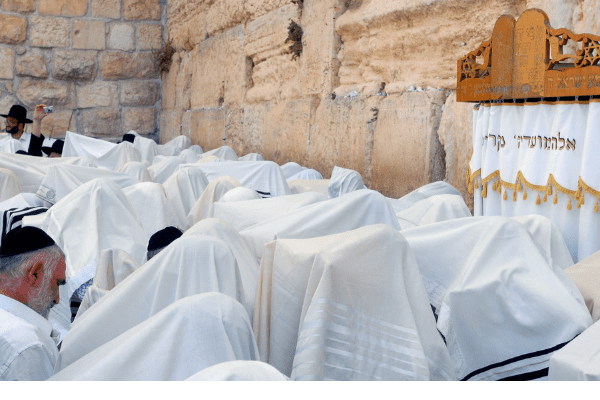
TORAH
NEVI'IM
KETUVIM
Chapter 21
Translation and Transliteration of
Listen to this chapter in Hebrew:
- Commentary
- Buy E-book
- Buy the Israel Bible
1Hashem said to Moshe: Speak to the Kohanim, the sons of Aharon, and say to them: None shall defile himself for any [dead] person among his kin,
va-YO-mer a-do-NAI el mo-SHEH e-MOR el ha-ko-ha-NEEM b'-NAY a-ha-RON v'-a-mar-TA a-lay-HEM l'-NE-fesh lo yi-ta-MA b'-a-MAV
אוַיֹּאמֶר יְהֹוָה אֶל־מֹשֶׁה אֱמֹר אֶל־הַכֹּהֲנִים בְּנֵי אַהֲרֹן וְאָמַרְתָּ אֲלֵהֶם לְנֶפֶשׁ לֹא־יִטַּמָּא בְּעַמָּיו׃
![]() 21:1 None shall defile himself for any [dead] person among his kin
21:1 None shall defile himself for any [dead] person among his kin
While the entire Nation of Israel is commanded to maintain a certain level of holiness, the Kohanim were held to an even higher standard. For example, a priest may not become ritually impure through contact with a dead body. Therefore, he may not participate in the burial of anyone other than his immediate relatives. However, Rashi teaches that there is an exception to this rule. If there is no one else to bury the person, then even the Kohen Gadol is obligated to perform the burial, even if the deceased is not “among his kin.” This is particularly striking, since under normal circumstances, unlike ordinary Kohanim, the Kohen Gadol may not participate in the burial of even his closest relatives. In this way, the Bible teaches that an elevated status must not make one oblivious to the needs of people. On the contrary, it is the obligation of those with heightened responsibility to see to it that everyone is taken care of, even at the expense of their own personal state of holiness.
2except for the relatives that are closest to him: his mother, his father, his son, his daughter, and his brother;
בכִּי אִם־לִשְׁאֵרוֹ הַקָּרֹב אֵלָיו לְאִמּוֹ וּלְאָבִיו וְלִבְנוֹ וּלְבִתּוֹ וּלְאָחִיו׃
3also for a virgin sister, close to him because she has not married, for her he may defile himself.
גוְלַאֲחֹתוֹ הַבְּתוּלָה הַקְּרוֹבָה אֵלָיו אֲשֶׁר לֹא־הָיְתָה לְאִישׁ לָהּ יִטַּמָּא׃
4But he shall not defile himself as a kinsman by marriage, and so profane himself.
דלֹא יִטַּמָּא בַּעַל בְּעַמָּיו לְהֵחַלּוֹ׃
5They shall not shave smooth any part of their heads, or cut the side-growth of their beards, or make gashes in their flesh.
הלֹא־יקרחה [יִקְרְחוּ] קָרְחָה בְּרֹאשָׁם וּפְאַת זְקָנָם לֹא יְגַלֵּחוּ וּבִבְשָׂרָם לֹא יִשְׂרְטוּ שָׂרָטֶת׃
6They shall be holy to their God and not profane the name of their God; for they offer Hashem's offerings by fire, the food of their God, and so must be holy.
וקְדֹשִׁים יִהְיוּ לֵאלֹהֵיהֶם וְלֹא יְחַלְּלוּ שֵׁם אֱלֹהֵיהֶם כִּי אֶת־אִשֵּׁי יְהֹוָה לֶחֶם אֱלֹהֵיהֶם הֵם מַקְרִיבִם וְהָיוּ קֹדֶשׁ׃
7They shall not marry a woman defiled by harlotry, nor shall they marry one divorced from her husband. For they are holy to their God
זאִשָּׁה זֹנָה וַחֲלָלָה לֹא יִקָּחוּ וְאִשָּׁה גְּרוּשָׁה מֵאִישָׁהּ לֹא יִקָּחוּ כִּי־קָדֹשׁ הוּא לֵאלֹהָיו׃
8and you must treat them as holy, since they offer the food of your God; they shall be holy to you, for I Hashem who sanctify you am holy.
חוְקִדַּשְׁתּוֹ כִּי־אֶת־לֶחֶם אֱלֹהֶיךָ הוּא מַקְרִיב קָדֹשׁ יִהְיֶה־לָּךְ כִּי קָדוֹשׁ אֲנִי יְהֹוָה מְקַדִּשְׁכֶם׃
9When the daughter of a Kohen defiles herself through harlotry, it is her father whom she defiles; she shall be put to the fire.
טוּבַת אִישׁ כֹּהֵן כִּי תֵחֵל לִזְנוֹת אֶת־אָבִיהָ הִיא מְחַלֶּלֶת בָּאֵשׁ תִּשָּׂרֵף׃
10The Kohen who is exalted above his fellows, on whose head the anointing oil has been poured and who has been ordained to wear the vestments, shall not bare his head or rend his vestments.
יוְהַכֹּהֵן הַגָּדוֹל מֵאֶחָיו אֲשֶׁר־יוּצַק עַל־רֹאשׁוֹ שֶׁמֶן הַמִּשְׁחָה וּמִלֵּא אֶת־יָדוֹ לִלְבֹּשׁ אֶת־הַבְּגָדִים אֶת־רֹאשׁוֹ לֹא יִפְרָע וּבְגָדָיו לֹא יִפְרֹם׃
11He shall not go in where there is any dead body; he shall not defile himself even for his father or mother.
יאוְעַל כָּל־נַפְשֹׁת מֵת לֹא יָבֹא לְאָבִיו וּלְאִמּוֹ לֹא יִטַּמָּא׃
12He shall not go outside the sanctuary and profane the sanctuary of his God, for upon him is the distinction of the anointing oil of his God, Mine Hashem's.
יבוּמִן־הַמִּקְדָּשׁ לֹא יֵצֵא וְלֹא יְחַלֵּל אֵת מִקְדַּשׁ אֱלֹהָיו כִּי נֵזֶר שֶׁמֶן מִשְׁחַת אֱלֹהָיו עָלָיו אֲנִי יְהֹוָה׃
13He may marry only a woman who is a virgin.
יגוְהוּא אִשָּׁה בִבְתוּלֶיהָ יִקָּח׃
14A widow, or a divorced woman, or one who is degraded by harlotry—such he may not marry. Only a virgin of his own kin may he take to wife—
ידאַלְמָנָה וּגְרוּשָׁה וַחֲלָלָה זֹנָה אֶת־אֵלֶּה לֹא יִקָּח כִּי אִם־בְּתוּלָה מֵעַמָּיו יִקַּח אִשָּׁה׃
15that he may not profane his offspring among his kin, for I Hashem have sanctified him.
טווְלֹא־יְחַלֵּל זַרְעוֹ בְּעַמָּיו כִּי אֲנִי יְהֹוָה מְקַדְּשׁוֹ׃
16Hashem spoke further to Moshe:
טזוַיְדַבֵּר יְהֹוָה אֶל־מֹשֶׁה לֵּאמֹר׃
17Speak to Aharon and say: No man of your offspring throughout the ages who has a defect shall be qualified to offer the food of his God.
יזדַּבֵּר אֶל־אַהֲרֹן לֵאמֹר אִישׁ מִזַּרְעֲךָ לְדֹרֹתָם אֲשֶׁר יִהְיֶה בוֹ מוּם לֹא יִקְרַב לְהַקְרִיב לֶחֶם אֱלֹהָיו׃
18No one at all who has a defect shall be qualified: no man who is blind, or lame, or has a limb too short or too long;
יחכִּי כָל־אִישׁ אֲשֶׁר־בּוֹ מוּם לֹא יִקְרָב אִישׁ עִוֵּר אוֹ פִסֵּחַ אוֹ חָרֻם אוֹ שָׂרוּעַ׃
19no man who has a broken leg or a broken arm;
יטאוֹ אִישׁ אֲשֶׁר־יִהְיֶה בוֹ שֶׁבֶר רָגֶל אוֹ שֶׁבֶר יָד׃
20or who is a hunchback, or a dwarf, or who has a growth in his eye, or who has a boil-scar, or scurvy, or crushed testes.
כאוֹ־גִבֵּן אוֹ־דַק אוֹ תְּבַלֻּל בְּעֵינוֹ אוֹ גָרָב אוֹ יַלֶּפֶת אוֹ מְרוֹחַ אָשֶׁךְ׃
21No man among the offspring of Aharon the Kohen who has a defect shall be qualified to offer Hashem's offering by fire; having a defect, he shall not be qualified to offer the food of his God.
כאכָּל־אִישׁ אֲשֶׁר־בּוֹ מוּם מִזֶּרַע אַהֲרֹן הַכֹּהֵן לֹא יִגַּשׁ לְהַקְרִיב אֶת־אִשֵּׁי יְהֹוָה מוּם בּוֹ אֵת לֶחֶם אֱלֹהָיו לֹא יִגַּשׁ לְהַקְרִיב׃
22He may eat of the food of his God, of the most holy as well as of the holy;
כבלֶחֶם אֱלֹהָיו מִקָּדְשֵׁי הַקֳּדָשִׁים וּמִן־הַקֳּדָשִׁים יֹאכֵל׃
23but he shall not enter behind the curtain or come near the mizbayach, for he has a defect. He shall not profane these places sacred to Me, for I Hashem have sanctified them.
כגאַךְ אֶל־הַפָּרֹכֶת לֹא יָבֹא וְאֶל־הַמִּזְבֵּחַ לֹא יִגַּשׁ כִּי־מוּם בּוֹ וְלֹא יְחַלֵּל אֶת־מִקְדָּשַׁי כִּי אֲנִי יְהֹוָה מְקַדְּשָׁם׃
24Thus Moshe spoke to Aharon and his sons and to all the Israelites.
כדוַיְדַבֵּר מֹשֶׁה אֶל־אַהֲרֹן וְאֶל־בָּנָיו וְאֶל־כָּל־בְּנֵי יִשְׂרָאֵל׃







